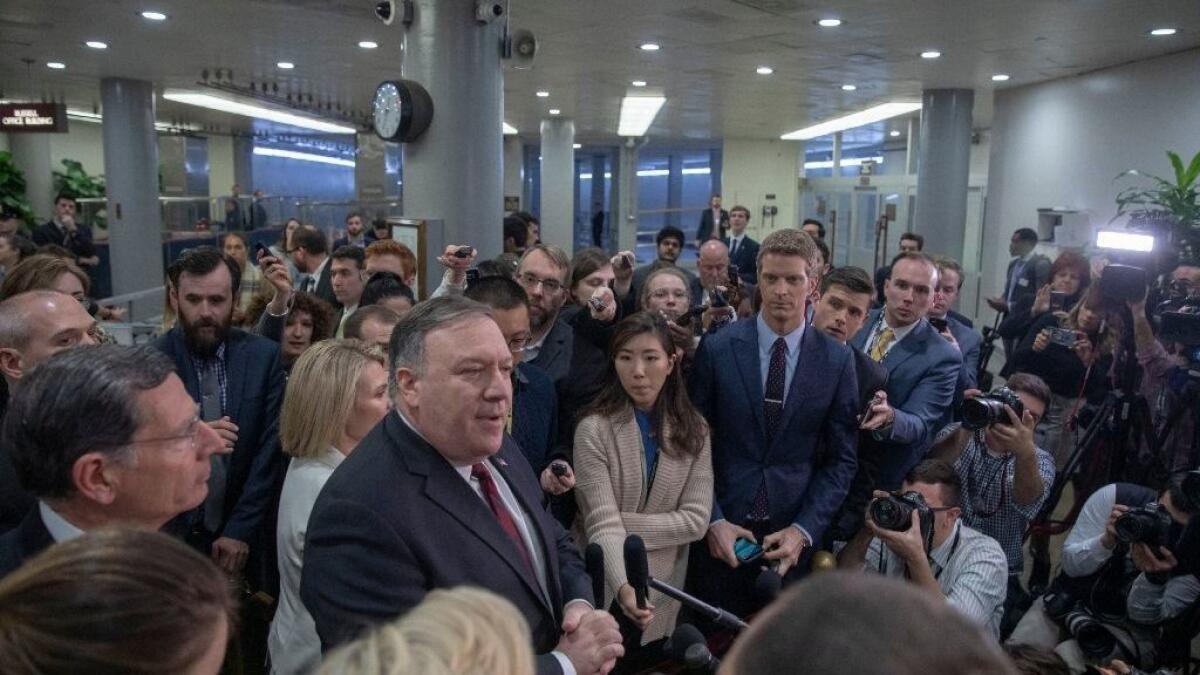In a rare rebuke of Trump, GOP senators join in calling for an end to U.S. support for Saudis’ war in Yemen

- Share via
Reporting from Washington — The Senate advanced a resolution Wednesday calling for an end to U.S. military support for Saudi Arabia’s war in Yemen, a rare bipartisan rebuke of the Trump administration’s foreign policy.
The 63-37 procedural vote moves the resolution to the Senate floor, where a vote is expected next week. It has not passed the House.
Winning the support of 14 Republicans for the largely symbolic measure was unusual since the Trump administration had strongly opposed it, sending Secretary of State Michael R. Pompeo and Defense Secretary James N. Mattis to Capitol Hill to appear in a closed-door session.
President Trump could veto the resolution if it passes, and the White House threatened to do so as the Senate voted.
The resolution calls for a halt to U.S. military aid for the Saudi-led coalition that is battling Iranian-backed Houthi rebels in Yemen. The civil war has killed tens of thousands of civilians and become what aid workers call the world’s worst humanitarian crisis.
Congressional anger at the Saudis has been stoked by the brutal killing of Jamal Khashoggi, a Saudi-born journalist who lived in Virginia, who was strangled and dismembered with a saw inside the Saudi Consulate in Istanbul, Turkey, on Oct. 2.
Sen. Mike Lee (R-Utah), a co-sponsor of the resolution, said ending U.S. support for the Saudi war in Yemen was long overdue.
“The bloodshed continues, still abetted by the United States, even amidst further revelations of Saudi depravity,” Lee said. Saudi Arabia “is not an ally that deserves our support,” he added.
Sen. Todd Young (R-Ind.) said that he had opposed a similar resolution in March, but that conditions in Yemen have drastically worsened.
Trump has given Saudi Arabia a pass for the Khashoggi killing, arguing that U.S. weapons sales to the kingdom outweighed human rights concerns. Pompeo, in an op-ed for the Wall Street Journal, described protests over Khashoggi’s death as “caterwauling” and said there was “no smoking gun” that implicated Saudi Arabia’s de facto ruler, Crown Prince Mohammed bin Salman.
Several lawmakers demanded that CIA Director Gina Haspel provide a briefing, but the administration refused to make her available. Haspel has listened to an audiotape of Khashoggi’s grisly killing, and the CIA reportedly has concluded with high confidence that the crown prince was responsible.
Sen. Bob Corker (R-Tenn.), who chairs the Foreign Relations Committee, said he believed Mohammed “was involved in this killing.”
Sen. Lindsey Graham (R-S.C.) said he supported the resolution because he was so angry at the White House for its handling of the Saudis and Haspel’s failure to appear at the briefing.
Mattis played down the U.S. military role in Yemen, saying that “the U.S. is not operationally involved in hostilities in Yemen’s civil war.”
He argued that Congress lacked the legal authority to cut off U.S. support to the Saudi-led coalition because U.S. forces operate in a support role approved by Trump using his constitutional authority as commander in chief.
Hoping to head off congressional action, the Pentagon halted midair refueling of Saudi and United Arab Emirates warplanes this month, removing the major U.S. operational role in the conflict.
But the Pentagon is continuing to supply intelligence and logistics help to the Saudis.
U.S. officials argue that even a symbolic Senate rebuke of Saudi Arabia or a congressional cutoff of arms sales to the kingdom will cause the United States to pull out of the United Nations-sponsored Yemen peace talks.
Mattis staunchly defended the U.S. relationship with Saudi Arabia, despite the killing of Khashoggi, saying that Riyadh was crucial to the U.S. strategy for countering Iran.
“We seldom are free to work with unblemished partners,” he told lawmakers. “Saudi Arabia, due to geography and the Iranian threat, is fundamental to maintaining regional and Israeli security, and to our interest in Mideast stability.”
For more on international affairs, follow @TracyKWilkinson on Twitter
More to Read
Sign up for Essential California
The most important California stories and recommendations in your inbox every morning.
You may occasionally receive promotional content from the Los Angeles Times.












